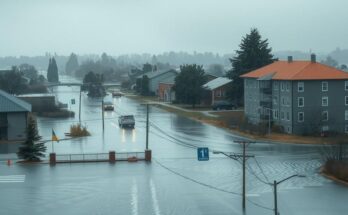Rising sea temperatures linked to climate change are resulting in higher rates of vibriosis infections in the United States, with 80,000 cases reported annually. Researchers are employing satellite data to create predictive models assessing infection risks along the East Coast, aiming to aid public health efforts in mitigating potential outbreaks and informing affected communities.
The escalating effects of climate change are notably influencing the spread of vibriosis, a dangerous bacterial infection linked to warmer ocean waters. Annually, an estimated 80,000 Americans contract vibriosis, primarily through the consumption of undercooked seafood contaminated with Vibrio bacteria. Research conducted by microbiologist Rita Colwell and her team at the University of Maryland reveals that hospitalization rates for vibriosis in Maryland increased significantly from 2013 to 2019 compared to the previous years. This uptick is indicative of a worrying trend, with cases now appearing farther north along the East Coast of the United States.
A crucial aspect of this research involves understanding how environmental factors, such as sea temperature and salinity changes following hurricanes, create optimal conditions for Vibrio bacteria’s proliferation. Colwell emphasizes, “You have a catastrophe in the making,” reflecting the urgent nature of this health crisis amid rising sea temperatures. Collaboration with environmental engineers, including Antarpreet Jutla from the University of Florida, has led to the creation of a predictive model aimed at forecasting vibriosis risks along the Eastern Seaboard. This model utilizes satellite data to analyze optimal conditions for bacterial growth, offering potential preventive measures against future outbreaks.
Significantly, the model will also identify which Vibrio species are present in particular waters, as different species can lead to varying health hazards. For instance, Vibrio vulnificus poses severe health risks, including limb amputation or fatality if untreated, and its prevalence has increased greatly since the late 1980s. The researchers aim to assist public health departments in issuing tailored warnings to communities at risk of exposure.
They foresee this model as a promising instrument not only in combating vibriosis but eventually extending its application to other pathogens such as Salmonella and norovirus. By addressing these potential outbreaks proactively, communities may significantly reduce infection rates and healthcare costs, which could reach billions annually due to vibriosis-related incidents driven by climate change.
The article discusses the public health threat posed by vibriosis, a bacterial infection increasingly prevalent due to rising sea temperatures associated with climate change. The research highlights the causal relationships between environmental factors and the proliferation of Vibrio bacteria, particularly after extreme weather events. By utilizing advanced satellite data and predictive modeling, scientists aim to foresee and mitigate the impacts of vibriosis outbreaks on affected populations along the East Coast of the United States.
In summary, the ongoing research underscores the urgent need to address the public health implications of climate change, particularly the rise of vibriosis infections. As rising sea temperatures facilitate the spread of Vibrio bacteria, developing predictive models will be crucial for the timely issuance of health warnings to at-risk communities. This proactive approach can not only enhance public safety but also reduce the anticipated economic burden associated with vibriosis-related healthcare costs.
Original Source: whowhatwhy.org




